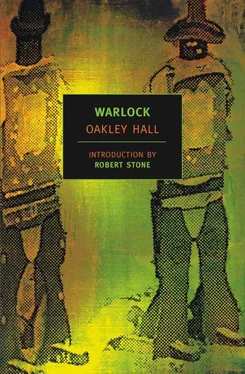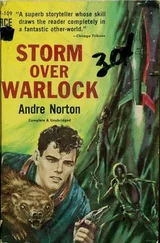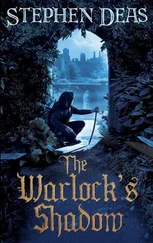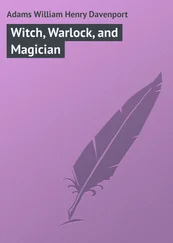But Abe only shrugged and said, “Can’t go against what everybody thinks of you.” Then, after a time, he said, “Can’t run and I can’t go against him. He is fast. He is faster than anybody in the country. He’s— He’d—”
He stopped, staring, and Curley turned to see the brown dog trotting around the corner of the house, his dark-spotted tongue lolling from his mouth. Abe leaned back stiffly. His hand flicked down, and up; his Colt crashed with a spit of fire and smoke and the dog was knocked rolling in the dirt with about a half a yelp. The Colt crashed and spat again and again, and with each shot the brown, bloody, dusty body was pushed farther away as though it were being jerked along on the end of a rope.
“Like that!” Abe whispered, as the gunsmoke blew away around him. He holstered his Colt. “Like that,” he said again.
28. JOURNALS OF HENRY HOLMES GOODPASTURE
March 12, 1881
I HAD thought this affair of only local importance. It did not occur to me that it had spread beyond the territory. I was surprised to read a long account of it in a San Antonio paper which someone brought here, and now I have come into possession of a magazine called the Western Gazette . This so-called journal combines cheapjack writing with smudged print upon coarse paper, and is devoted almost entirely to an affair vaguely resembling, and called, “The Battle in the Acme Corral.” It is a strange experience to read an account such as this, where an occurrence one is closely acquainted with is transformed into something wild, woolly, and improbable, with only the names true, and not all of them by any means. There is a crude illustration upon the cover, depicting a huge St. George of a man whose six-shooter is almost as long as a sword, confronting a host of sombreroed dragons. The execrably written text might be the more infuriating if Blaisedell were held to be the villain of the piece, but possibly nothing could be more intolerable than the fulsome praise, the impossible prowess and nobility, and the heroic speeches that make the gorge rise. The author listed nine dead, of whom Morgan was credited with three. It is fantastic to think of people reading, and believing, this vile fiction, which is solemnly presented as Truth. Buck says there were a number of newspapermen at the trial, however, some of whom had come from great distances to attend it. Presumably Warlock will now go down in History as the site of “The Battle in the Acme Corral,” as well as of the Medusa Mine. Blood is as stirring to the human imagination as silver.
I was struck by the artist’s depiction of Blaisedell as a huge man. Since the corral shown has nothing to do with the original, other than its name, and the representation of Blaisedell the same, I find myself wondering why the artist chose to draw a great brute of a fellow. A rough-and-tumble Hero for a rough-and-tumble people? Feats of strength being more appealing than feats of finesse? No doubt the artist knows better than I the correct heroic image to present to a republican mentality.
This magazine has affected me more deeply than merely with the contempt and anger I felt upon first examining it. For are we not, perhaps, here in Warlock, sitting in upon the childbed of a Legend? Are we watching such a momentous birth all unknowingly, and, unknowing too, this one or that one of us helping it along, acting as midwife, boiling the water, holding the swaddling clothes, etc? As time goes on and if the infant does not die (literally!), and continues to grow, will not this cheap and fabulous account in this poor excuse for a magazine become, on its terms, a version much more acceptable than ours, the true one? It is a curious thought; how much do these legends, as they outstrip and supersede their originals, rest upon Truth, and how much upon some dark and impenetrable design within Man himself?
March 18, 1881
A most pleasant evening last night, spent with Buck, Joe Kennon, Jed Rolfe, Will Hart, Fred Winters, and the doctor. I held forth mightily, I talked my mouth dry, and my listeners’ ears to tatters; but I must hold that Blaisedell is a virtuous man (against no opposition in that company), and that the Acme Corral was a tragedy for him since it was not a clear-cut victory. For he deserves no other kind.
We speculated on the fact that Blaisedell has not yet returned to Warlock, although it has been two weeks since his acquittal. Morgan has been to Bright’s City, undoubtedly to see him, but has made no comment or explanation that I have heard. My fear is that Blaisedell will not return at all. This would be a blow to us, for I fear our uneasy peace is coming to an end. A miner was killed by one of his fellows in a quarrel at the French Palace last Thursday night. The survivor was arrested and has been sent to Bright’s City for trial, but it is felt that this would not have happened had Blaisedell been here. Will Hart has heard he is riding a tiger in a Bright’s City gambling hall and does not wish to quit while he is winning. Buck is irritated with him; after all, there were no provisions made for long vacations in the terms of his employment. We all, of course, fear that Warlock will revert to her former state of violence and lawlessness in his absence, temporary or permanent.
Will, I think, feels that Blaisedell would do better not to return. That, for instance, he might take offense at talk and be forced into petty quarrels. This has occurred to me too. Yet I myself want Blaisedell to return, not merely for the sake of peace here, but in order that he may in some way redeem himself in a further and completely unambiguous action. Joe Kennon, a straightforward man, wishes Blaisedell to return and kill McQuown. Buck Slavin, not so straightforward, fears that McQuown may be feeling vengeful toward him because he has sided with Blaisedell, and wishes devoutly for the same consummation. Buck proclaims that all disorder and lawlessness would die with the San Pabloite, peace would reign, and commerce flourish forever after.
McQuown’s death by gunplay, I am afraid, is the climax I also desire. Blaisedell’s reputation is important to me. It is as though, through him, I can see a bit of myself immortalized, and the others of this town, and even the whole of this western country. For how can this be done but through those men who, because of their stature among us, we raise still further in tall tales and legends that denote our respect, and which are taken by the world and the generations, from us, as standing for us?
March 20, 1881
It is said that Blaisedell’s decision to go to Bright’s City and endure trial was to a large degree brought about by Judge Holloway’s righteous rantings at him. I have heard the judge cursed for this often of late. Pike Skinner is especially bitter toward him, and there is a rumor that when Schroeder heard that Blaisedell had departed for Bright’s City, he physically assaulted the judge as being the cause. The old story, that arises whenever the judge is in an unpopular phase, is also current again: that he was run out of Dade County, Texas, where he was a J.P., for drunkenness and other more sinister vices. But I must defend him, and counter with the story which seems to me at least complementary to the other: that he was run out of Dade County because he tried to expose a criminally inclined sheriff who was, unfortunately, much better liked by the Texans than Judge Holloway and Rectitude.
I have also heard that he was at one time judge on a bench of some importance in Kansas, where people became so inflamed against him because of a series of unpopular decisions — I have no doubt that these were righteous ones, righteously delivered — that they tarred, feathered, and rode him out of town on a rail.
Certainly he is a bitter man, and one impossible to know, but if there are kernels of truth in these two tales of him, the outlines of his bitterness begin to show; nor will I condemn a man for trying to drown an abysmal bitterness in alcohol. He is a lonely man, too; he has no friends, nor even any regular drinking companions. He is uncomfortable company.
Читать дальше







